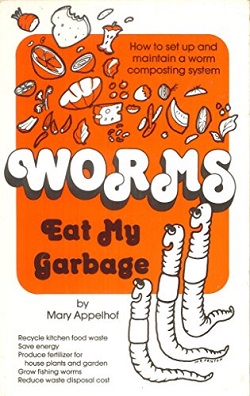Worms Eat My Garbage
Worms Eat My Garbage is a book written by Mary Appelhof that serves as a comprehensive guide to vermicomposting, the process of using earthworms to convert organic waste into nutrient-rich compost. The book is widely regarded as a seminal work in the field of composting and has inspired many individuals to adopt vermicomposting as a sustainable waste management practice.
Overview[edit | edit source]
The book provides detailed instructions on how to set up and maintain a vermicomposting system. It covers topics such as the types of earthworms best suited for composting, the materials needed to create a worm bin, and the types of organic waste that can be composted. The book also addresses common issues that may arise during the composting process and offers solutions to ensure the health and productivity of the worm bin.
Key Topics[edit | edit source]
Vermicomposting[edit | edit source]
Vermicomposting is the process of using earthworms to decompose organic waste. The book explains the benefits of vermicomposting, including the production of high-quality compost, the reduction of household waste, and the promotion of sustainable gardening practices.
Earthworms[edit | edit source]
The book focuses on the use of red wigglers (Eisenia fetida) as the preferred species of earthworms for vermicomposting. These worms are known for their ability to thrive in a composting environment and efficiently break down organic matter.
Worm Bin Setup[edit | edit source]
Detailed instructions are provided on how to construct and maintain a worm bin. The book covers the selection of appropriate containers, bedding materials, and the initial setup process. It also discusses the importance of maintaining proper moisture levels and aeration within the bin.
Feeding the Worms[edit | edit source]
The book outlines the types of organic waste that can be fed to the worms, including fruit and vegetable scraps, coffee grounds, and eggshells. It also advises on the types of waste to avoid, such as meat, dairy products, and oily foods, which can create odors and attract pests.
Harvesting Compost[edit | edit source]
Instructions are provided on how to harvest the finished compost, also known as worm castings, from the worm bin. The book explains the various methods for separating the worms from the compost and how to use the compost in gardening and soil improvement.
Impact and Legacy[edit | edit source]
Worms Eat My Garbage has had a significant impact on the promotion of vermicomposting as a sustainable waste management practice. The book has been widely used by educators, environmentalists, and home gardeners to teach and implement vermicomposting. It has also contributed to the growing awareness of the importance of reducing organic waste and promoting soil health.
See Also[edit | edit source]
References[edit | edit source]
External Links[edit | edit source]
This composting related article is a stub. You can help WikiMD by expanding it.
Search WikiMD
Ad.Tired of being Overweight? Try W8MD's physician weight loss program.
Semaglutide (Ozempic / Wegovy and Tirzepatide (Mounjaro / Zepbound) available.
Advertise on WikiMD
|
WikiMD's Wellness Encyclopedia |
| Let Food Be Thy Medicine Medicine Thy Food - Hippocrates |
Translate this page: - East Asian
中文,
日本,
한국어,
South Asian
हिन्दी,
தமிழ்,
తెలుగు,
Urdu,
ಕನ್ನಡ,
Southeast Asian
Indonesian,
Vietnamese,
Thai,
မြန်မာဘာသာ,
বাংলা
European
español,
Deutsch,
français,
Greek,
português do Brasil,
polski,
română,
русский,
Nederlands,
norsk,
svenska,
suomi,
Italian
Middle Eastern & African
عربى,
Turkish,
Persian,
Hebrew,
Afrikaans,
isiZulu,
Kiswahili,
Other
Bulgarian,
Hungarian,
Czech,
Swedish,
മലയാളം,
मराठी,
ਪੰਜਾਬੀ,
ગુજરાતી,
Portuguese,
Ukrainian
Medical Disclaimer: WikiMD is not a substitute for professional medical advice. The information on WikiMD is provided as an information resource only, may be incorrect, outdated or misleading, and is not to be used or relied on for any diagnostic or treatment purposes. Please consult your health care provider before making any healthcare decisions or for guidance about a specific medical condition. WikiMD expressly disclaims responsibility, and shall have no liability, for any damages, loss, injury, or liability whatsoever suffered as a result of your reliance on the information contained in this site. By visiting this site you agree to the foregoing terms and conditions, which may from time to time be changed or supplemented by WikiMD. If you do not agree to the foregoing terms and conditions, you should not enter or use this site. See full disclaimer.
Credits:Most images are courtesy of Wikimedia commons, and templates Wikipedia, licensed under CC BY SA or similar.
Contributors: Prab R. Tumpati, MD

